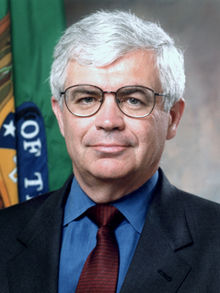
Back جون تايلور (عالم) Arabic جون تايلور (اكاديمى) ARZ John B. Taylor German John B. Taylor Spanish جان بی. تیلور Persian John B. Taylor French John B. Taylor Italian ジョン・ブライアン・テイラー Japanese John B. Taylor Dutch John B. Taylor Portuguese
John Taylor | |
|---|---|
 | |
| Under Secretary of the Treasury for International Affairs | |
| In office 2001–2005 | |
| President | George W. Bush |
| Preceded by | Timothy Geithner |
| Succeeded by | Timothy D. Adams |
| Personal details | |
| Born | John Brian Taylor December 8, 1946 Yonkers, New York, U.S. |
| Political party | Republican |
| Education | Princeton University (BA) Stanford University (PhD) |
| Academic career | |
| Institutions | Stanford University Hoover Institution Columbia University |
| Field | Monetary economics |
| School or tradition | New Keynesian economics |
| Doctoral advisor | Theodore Wilbur Anderson[1] |
| Doctoral students | Lawrence J. Christiano |
| Influences | Milton Friedman Paul Volcker E. Philip Howrey Alan Greenspan |
| Contributions | Taylor rule |
| Information at IDEAS / RePEc | |
John Brian Taylor (born December 8, 1946) is the Mary and Robert Raymond Professor of Economics at Stanford University, and the George P. Shultz Senior Fellow in Economics at Stanford University's Hoover Institution.[2]
He taught at Columbia University from 1973 to 1980 and the Woodrow Wilson School and Economics Department of Princeton University from 1980 to 1984 before returning to Stanford. He has received several teaching prizes and teaches Stanford's introductory economics course as well as PhD courses in monetary economics.[3]
In research published in 1979 and 1980 he developed a model of price and wage setting—called the staggered contract model—which served as an underpinning of a new class of empirical models with rational expectations and sticky prices—sometimes called new Keynesian models.[4][5] In a 1993 paper he proposed the Taylor rule,[6] intended as a recommendation about how nominal interest rates should be determined, which then became a rough summary of how central banks actually do set them. He has been active in public policy, serving as the Under Secretary of the Treasury for International Affairs during the first term of the George W. Bush Administration. His book Global Financial Warriors chronicles this period.[7] He was a member of the President's Council of Economic Advisors during the George H. W. Bush Administration and Senior Economist at the Council of Economic Advisors during the Ford and Carter Administrations.
In 2012 he was included in the 50 Most Influential list of Bloomberg Markets Magazine. Thomson Reuters lists Taylor among the "citation laureates" who are likely future winners of the Nobel Prize in Economics.[8] He was president of the Mont Pelerin Society from 2018 to 2020.[9]
- ^ Taylor, John B. (September 24, 2016). "The Statistical Analysis of Policy Rules". economicsone.com. Economics One (A blog by John B. Taylor). Retrieved October 2, 2016.
- ^ "Hoover Institution Senior Fellow: Biography". Hoover Institution. Retrieved 27 October 2011.
- ^ Taylor, John B. "Curriculum vitae" (PDF). Stanford University.
{{cite journal}}: Cite journal requires|journal=(help) - ^ Taylor, John B. (May 1979). "Staggered wage setting in a macro model". The American Economic Review. 69 (2). American Economic Association: 108–113. JSTOR 1801626.
- Reprinted in Taylor, John B. (1991), "Staggered wage setting in a macro model", in Mankiw, N. Gregory; Romer, David (eds.), New Keynesian economics, volume 1, Cambridge, Massachusetts: MIT Press, pp. 233–242, ISBN 9780262631334.
- ^ Taylor, John B. (February 1980). "Aggregate dynamics and staggered contracts". Journal of Political Economy. 88 (1): 1–23. doi:10.1086/260845. JSTOR 1830957. S2CID 154446910.
- ^ Taylor, John B. (December 1993). "Discretion versus policy rules in practice". Carnegie-Rochester Conference Series on Public Policy. 39: 195–214. doi:10.1016/0167-2231(93)90009-L. Pdf.
- ^ Taylor, John B. (2007). Global financial warriors: the untold story of international finance in the post-9/11 world. New York: W.W. Norton. ISBN 9780393064483.
- ^ "Hall of 'citation laureates' (in economics)". science.thomsonreuters.com. Thomson-Reuters. Archived from the original on 2011-12-02. Retrieved 2011-09-29.
- ^ "Past Presidents - The Mont Pelerin Society". www.montpelerin.org. Retrieved 2023-10-22.
© MMXXIII Rich X Search. We shall prevail. All rights reserved. Rich X Search